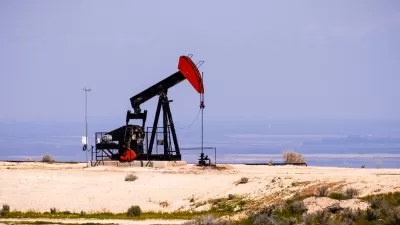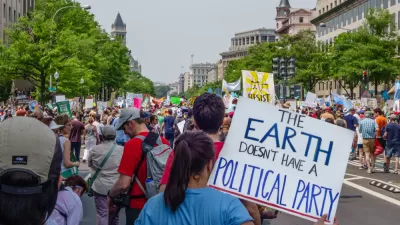As climate hawks gather in San Francisco for the Global Climate Action Summit that convenes Wednesday, Gov. Jerry Brown, host of the summit, is dogged by critics who can't distinguish between oil production and consumption.
We've been here before. Anti-fracking activists charge Gov. Jerry Brown (D-Calif.), who just Saturday signed legislation to block new federal offshore oil drilling along California’s coast, with environmental hypocrisy for hosting the Global Climate Action Summit* in the nation’s sixth-largest oil-producing state, writes Julie Cart, environmental reporter for CALmatters, a Sacramento-based nonpartisan, nonprofit journalism venture.
Their message: The California governor, widely known as a climate defender, is in fact a climate offender. He should ban fracking in California, stop issuing oil-drilling permits and find a way to wean the state off fossil fuels, his critics say. Now.
Planetizen covered Brown's response to the keep it in the ground movement a year ago in an article by John Wildermuth of the San Francisco Chronicle on May 16, 2017:
“As we bring down consumption, we can bring down production,” the governor said, but since California residents now drive about 330 billion miles a year, most of it in vehicles powered by gasoline or diesel, there’s a long way to go.
“California is only producing 30 percent of its oil,” Brown said. “The rest comes in ships, mostly, but increasingly in trains.”
Cutting the state’s oil production without cutting demand just means that more of California’s oil will come from other states or other countries, which may not have the strong restrictions on fracking and oil production that California now has.
Oil production decreases as consumption increases
Wildermuth wrote that California was the third highest oil producer, trailing only Texas and North Dakota. "Kern County alone pumps more oil than Oklahoma, accounting for more than 70 percent of California’s production and more than 90 percent of its fracked wells," he noted.
A year later, Cart reports that California oil production compared to other states has dropped dramatically.
U.S. crude oil production (thousands of barrels) in May 2018
|
|
|
|
|
|
|
|
|
|
|
|
|
|
|
|
|
|
|
|
|
|
|
Courtesy of U.S. Energy Information Administration
While oil production relative to other states dropped, oil consumption and emissions from transportation, continue to increase. The California Greenhouse Gas Emission Inventory - 2018 Edition (posted here in July), showed that while emissions from electricity generation declined 18 percent in 2016, emissions from transportation rose 2 percent, accounting for 41 percent of the inventory. By contrast, electricity generation was the third highest sector, accounting for 16 percent of emissions, behind industry at 23 percent.
The most far-reaching carbon cutting legislation passed this year does nothing to reduce transportation emissions. Instead, it tackles electricity generation.
A report released earlier this month pointed to increased driving, stemming from the state's chronic housing crisis, and Californians' preference for SUVs over cars, as two reasons for the increase.
And recent developments threaten to make a bad situation worse:
- Strict greenhouse gas emissions standards from light duty vehicles are under attack by the Trump administration.
- On Nov. 6, Californians will decide whether to repeal new transportation user fees, including a 12 cents per gallon gas tax, that would be directed to repair roads and assist public transit.
The state's challenge to reduce greenhouse gas emissions from the transportation sector is formidable. The California Air Resources Board has laid out a path to achieve a 50 percent reduction in oil consumption by 2030 [pdf]. Demanding that the state stop oil production does nothing to achieve that end.
*For more information on the summit, see Julie Cart's article: "Heavy hitters on climate change will converge on San Francisco this week, with Gov. Jerry Brown as host."
FULL STORY: A blind spot in Gov. Jerry Brown’s green worldview? Critics say yes—it’s oil

Alabama: Trump Terminates Settlements for Black Communities Harmed By Raw Sewage
Trump deemed the landmark civil rights agreement “illegal DEI and environmental justice policy.”

Study: Maui’s Plan to Convert Vacation Rentals to Long-Term Housing Could Cause Nearly $1 Billion Economic Loss
The plan would reduce visitor accommodation by 25% resulting in 1,900 jobs lost.

Planetizen Federal Action Tracker
A weekly monitor of how Trump’s orders and actions are impacting planners and planning in America.

Baltimore Ordered to Improve Sidewalk Accessibility
The city is one of many to face lawsuits for failing to comply with the Americans with Disabilities Act.

This Toronto Suburb Has More Bus Riders Than Columbus, Ohio
Brampton, Ontario used gradual improvements in service to prove that if you build it, they will ride.

Paris Bike Boom Leads to Steep Drop in Air Pollution
The French city’s air quality has improved dramatically in the past 20 years, coinciding with a growth in cycling.
Urban Design for Planners 1: Software Tools
This six-course series explores essential urban design concepts using open source software and equips planners with the tools they need to participate fully in the urban design process.
Planning for Universal Design
Learn the tools for implementing Universal Design in planning regulations.
Smith Gee Studio
Alamo Area Metropolitan Planning Organization
City of Santa Clarita
Institute for Housing and Urban Development Studies (IHS)
City of Grandview
Harvard GSD Executive Education
Toledo-Lucas County Plan Commissions
Salt Lake City
NYU Wagner Graduate School of Public Service




























